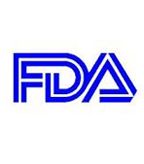FDA Approves Afatinib for Advanced Lung Cancer
The FDA approved afatinib (Gilotrif) as a first-line therapy for patients with metastatic non-small-cell lung cancer whose tumors harbor certain mutations in the epidermal growth factor receptor gene.
The US Food and Drug Administration (FDA) today approved afatinib (Gilotrif) as a first-line therapy for patients with metastatic non–small-cell lung cancer (NSCLC) whose tumors harbor certain mutations in the epidermal growth factor receptor (EGFR) gene. Afatinib is an oral inhibitor of EGFR, a tyrosine kinase, developed by Boehringer Ingelheim.

Along with afatinib, the FDA also approved a diagnostic that will test patients for presence of EGFR mutations. The therascreen EGFR RGQ PCR Kit, developed by Qiagen, was developed alongside afatinib. Afatinib is approved for patients whose tumors express one of two mutations in EGFR: a deletion of exon 19 or the L858R exon 21 mutation. These mutations along with a few more infrequent EGFR mutations account for about 10% of patients with NSCLC. NSCLC accounts for approximately 85% of all lung cancers.
Both the diagnostic and the drug were granted priority review by the FDA back in January.
This is the second oral drug targeting EGFR-mutated NSCLC approved by the FDA this year. In May, the FDA approved erlotinib (Tarceva) as a first-line treatment for patients with metastatic NSCLC who carry the EGFR mutations in exon 19 or 21. The drug was approved together with the cobas EGFR mutation diagnostic test.
The approval of afatinib is based on the 345-patient LUX-3 phase III clinical trial which showed that the drug improved progression-free survival of advanced NSCLC patients over the standard of care-up to 6 cycles of two chemotherapy drugs, pemetrexed and cisplatin. Patients in the afatinib arm with one of two EGFR mutations had a progression-free survival of 13.6 months compared with 6.9 months in the chemotherapy arm. More than half (56%) of patients in the afatinib arm had shrinkage of their tumors. However, the study did not show a significant advantage in overall survival for those patients in the afatinib arm compared to the chemotherapy arm.
While afatinib does come with serious side effects-lung inflammation, liver toxicities, severe rash, and diarrhea-the number of patients in the afatinib arm who dropped out because of toxicities was lower than the number in the chemotherapy arm (8% of afatinib-treated patients compared to 12% of chemotherapy-treated patients).
A version of the EGFR therascreen test is already approved in both Europe and Japan. Afatinib is currently under review by the European Medicines Agency.
Lung cancer is the main cause of death from cancer around the world in both men and women. The disease is still diagnosed mainly at an advanced stage when prognosis is poor and long-term survival is rare.